The Chobe Riverfront is an elephant mecca; home to the largest density of African elephants in the world. Travel here during winter and you’ll fast run out of fingers and toes while you count them drinking at the riverbanks and socialising out on the floodplains.
Thanks to its ease of access from Victoria Falls, the Chobe Riverfront is the busiest part of Botswana (though still a much quieter affair than most South or East African safaris). What Chobe lacks in solitude during the busier months, it more than makes up for with quality game viewing.
Chobe will leave you feeling tiny as giant elephant bulls stroll up next to your vehicle or snorkel alongside your boat. It will make you feel lost as hundreds of hippos and buffaloes crowd you out on the floodplains. It will put your heart in your throat as prides of lions stalk antelopes by the water’s edge, and it will leave you alone with your thoughts while the classic red sunsets melt over the river to a soundtrack of whistling fish eagles.
Chobe is not just a great introduction to Botswana. It also makes a rewarding repeat journey once you’ve ticked off the big stuff. It’s a place to search for the rare sable antelope, to spot that gem from the birders’ bucket list and to explore the remoter corners.
Where you stay in Chobe makes a huge difference to your safari experience. The most affordable options are at bigger hotels in a town setting where you’ll share your game drives with a few more vehicles. On the more exclusive end, stay in a wilder area in or around the park, listen to the sounds of the bush at night and get a head start on accessing the park for activities.
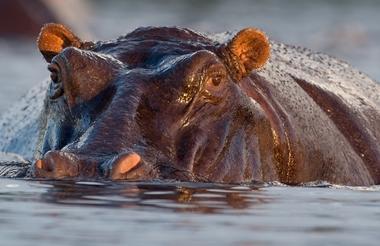
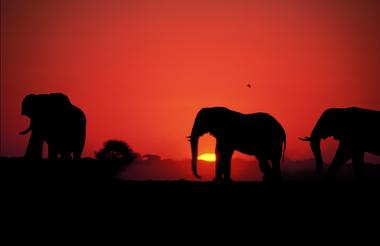
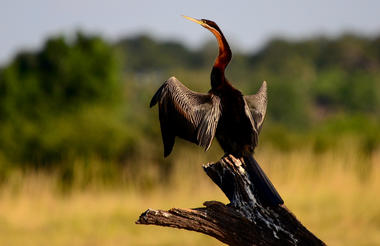
Looking at a map of Botswana, you’d miss Khwai completely if you didn’t know it was there. Wedged between the big-ticket attractions of Chobe National Park to the east and Moremi Game Reserve to the south, Khwai exists as a significant big game destination of its own.
Lying on the eastern fringes of the Okavango Delta with a rich wildlife population and no borders drawn around it on the map, Khwai is often overlooked in favour of its more famous neighbours, though in the winter months it can hold its own for the quality of big game viewing.
During your time here, you’ll spend most days exploring the narrow Khwai River, which forms the natural boundary to the Moremi Game Reserve on the south. The Khwai River is a beacon for wildlife and plays host to leopards stalking lechwe in the long grass, lions swimming from the banks to save their cubs’ during territorial disputes and crocodiles competing with wild dogs for a midday meal of impala.
As Khwai lies outside the parks, it offers the freedom and flexibility normally only possible with the heavier price tag of a private concession. Go off-road for a closer look at sightings, night drive in search of nocturnal species, and, with a little advance planning, head out on game walks to track wildlife on foot.
Khwai is also home to a village community where people live side by side with the resident wildlife. Some camps will offer village visits for a dose of cultural insight to go with your safari. For those not visiting the water camps of the delta, many camps in Khwai offer the chance to get out on a mokoro (traditional canoe), although excursions are less traditional in nature, skirting the riverbanks, rather than open delta floodplains.
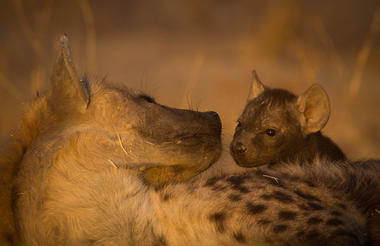
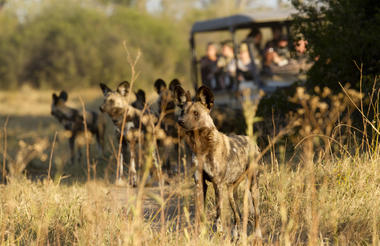
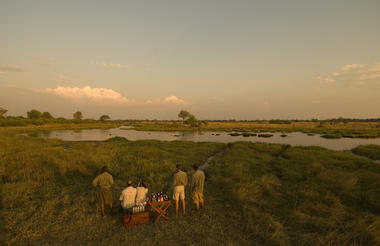
The Okavango Delta is where the wild things are: an immense, waterlogged oasis alive with elephants and birdlife, adrift in the middle of Kalahari sands. The real magic of the Delta lies in its water, trickling through from far away highlands, and spreading across the channels and floodplains.
During winter in the Kalahari, when the sun has baked the earth bare and turned the desert its driest, water fills the Okavango; transforming the floodplains into a Noah’s Ark of African wildlife.
As the water brings life to the delta, its local residents shape and recreate it. Termites slowly build mounds into islands, germinated with palm trees by passing elephants. Waterways open and close on the whim of wide-bottomed hippos, carving out channels where they crash through reeds, and leaving room behind them for exploration by mokoro.
The Okavango has many faces, which change throughout the year, prompted by that most unpredictable diva of all: the weather. Water levels rise and drop, expanding and shrinking islands, while animals move where the life is easiest and the grass greenest. In a few days, a sandy road driven by vehicle can become a waterway of unknowable depth, prompting a safari by boat instead.
Where and when you stay in the Okavango Delta will hugely influence what you do in the bush each day, the animals you’re most likely to see and finally, the safari experience you’ll have.
The delta’s watery heart is best discovered by mokoro through shallow channels and floodplains, as well as crossing the islands on foot. For less water and more of the big game, visit a camp on its drier edges (including Moremi Game Reserve and the Khwai Community Area), jump on a vehicle and seek out the animals hiding in the woodlands.
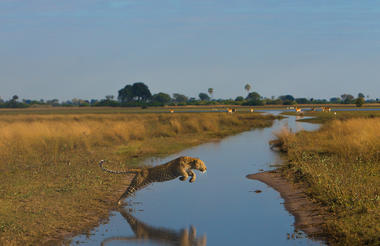
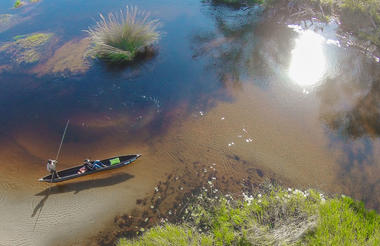
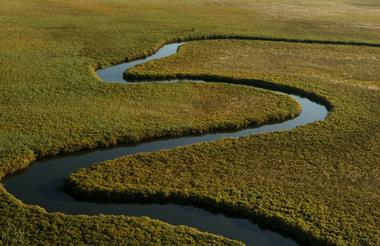
Situated along the banks of the Thamalakane River, in the North-West District of Botswana, Maun, a term that derives its name from the San language, meaning "the place of reeds," serves as the administrative town center of Ngamiland. Maun is notoriously known as a "Frontier" town, and is referred to as the 'gateway' to the Okavango Delta and Moremi Game Reserve as most tourists enter these destinations through this buzzing town.
Although classified as one of the fastest growing towns in Botswana, and boasting one of the busiest airports in Southern Africa, Maun still retains much of its old/traditional (village-like) character, which encompasses the old judicial court of chiefs who are still active. Reed and mud hut infrastructures are seen in and around town as well as donkeys/carts and livestock. However, numerous hotels, lodges, bed and breakfasts, shopping malls, post offices, a museum and a big hospital are available too. Maun also serves as the headquarters for the safari industry, tour operators and air charter companies that offer trips into the Okavango Delta and National Parks such as Moremi Game Reserve, Khwai, Savute, Makgadikgadi, Chobe, Nxai Pan to name a few, as well as monumental historical sites like the Tsodilo Hills. Opportunities to visit nearby cultural villages can also be arranged from this central point.
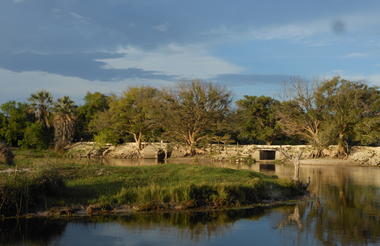


 (1) (002)1.png?fmt=png)


 (1) (002)1.png?fmt=png)
